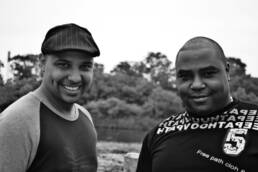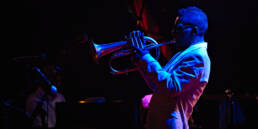There are musicians whose path is stardom. Their talent is their torch through the darker periods until they finally make it and become what they were destined to be. Though they rarely make it on their own, they usually have some sidekick musical companion in their career – a loyal friend who understands and sees what others are still unable to see or hear. Craig Ross to Lenny Kravitz or Mitch Mitchell to Jimi Hendrix are examples of these kinds of relationships.
Such is the case of Alexander Abreu, a giant in contemporary Cuban music, and his friend, colleague, excellent trombonist, composer, and even music facilitator Carlos Perez at some point in time. Carlos and Alexander’s friendship started many years back when they both were in the horns section of the Paulito FG Orchestra in the late 90s.
I met Carlos and Alexander in Copenhagen in the early 00s, and I’ve been following their work ever since. But it is just now that I have had the chance to talk with Carlos about his career. This interview came to be when I tried to collect chronologically all the fragmented stories told to me by both Carlos and Alexander over the years. The result was surprising because I realized how Carlos Perez had been a kind of “unsung” hero in the scope of the contemporary Cuban and International music scenes. Here is his interview for CM Music.

Carlo Livan Perez – Trombonist
When did you start playing music?
I started at age 11 in my hometown, Matanzas. I attended the vocational art school there. I always played the trombone, but I chose the trombone because of the lack of instruments in school. I originally wanted to study saxophone. Still, they didn’t have any left at school, so I chose the trombone out of necessity. Listening to orchestras like “Los Van Van” and “La Reve“made me more interested in the trombone.
How did you get to play professionally?
I started at 17 years old as a substitute musician for the orchestra of cabaret Parisien at the Hotel Nacional de Cuba. When I later became a permanent orchestra member, I started to work every day with some of the more seasoned musicians. I learned a lot there; it was a real school for me. Moreover, it was with them I experienced touring internationally for the first time in my life—an unforgettable period for me.
What was the first orchestra you played for the general public?
It was an orchestra called “T con E,” directed by Lazaro Valdez (Father), the former pianist of Benny More – also a significant period in my early career. Later I played with Tamayo and his salsa AM, which became popular thanks to their regular radio play on the radio … and in 1998, I started with Paulito FG’s orchestra. I played with many friends I had studied and met Alexander Abreu. Also there, I met another great of Cuban music, the maestro Juan Manuel Ceruto, who was the conductor and arranger of the orchestra. For me, he is one of the figures next to Jose Luis Cortés, whose creative cuts and arrangements defined the sound of timba music.
How was that special connection with Alexander?
During a tour with Paulito FG in Mexico, we had the opportunity to “cook” our musical ideas together, sometimes singing Alexander and others singing myself. Then, with the support of Ceruto, we could develop some exciting arrangements. Occasionally, during that tour, we had the chance to play our songs at the beginning of each show. So we improvised a lot. That was how we began to have more definite ideas of what we wanted to do musically together.
Paulito FG in Miami 1998, the two very young Alexander Abreu and Carlos Perez are seen playing in the show.
After we returned to Cuba, we started to record a new album with Paulito. But, then, Ceruto, our arranger, left in the middle of the production. So we were forced to take some of the album arrangements into our hands.
Shortly after that, I became a part of the Augusto Enriquez orchestra, where I met my good friend, the trombonist, producer, and co-founder of Havana D’ Primera, Amaury Perez, and together we brought Alexander to play with us.
That was a fantastic time for us; we had the opportunity to record various production projects in the studio under the direction of Ceruto and the maestro Juaquin Bentancourt. As a result, we recorded some of the classic and award-winning Cuban music albums during that period. Albums like “La Rumba soy yo” won the Latin Grammy in 2001, the tribute album to the great Cuban pianist Emiliano Salvador, and the classic album “Malecon” by the legendary Isaac Delgado.
How was your experience in Europe and the reunion with Alexander?
By late 2001 I moved to Copenhagen, where I started studying at the rhythmic conservatory to cultivate my spectrum in different genres, such as jazz, pop, and international music in general. It was an experience that I cherish dearly because, thanks to the learnings from that school, I could play later on in my career with some of the big international artists such as Luciano Pavarotti, Beth Hart, Joe Bonamassa, and Kid Creole.
Concierto Pavarotti and friends, Rome 2002. Carlos Perez, Alexander Abreu & Amaury Perez on the horns.
By 2004, I met in Copenhagen with Alexander during a tour of Isaac Delgado, where Alexander was the lead trumpet. By then, I had started the Grupo Danson project with Mia Engsager and Yasser Morejón Pino, and of course, for me, Alexander was a natural election to invite to be part of it.
From there, we recorded and released the “Mi Musica.” An album Alexander and I produced and arranged together. The album also allowed Alexander to record many of his compositions and officially debut as a singer. The result was a musical success that gave us the prize for the best world music album in Denmark in 2005, together with fantastic critical success for the project. Besides all that, it gave the foundation for Alexander to create his current orchestra, Havana D’primera. And you see, today, it is impossible to talk about Cuban music without mentioning Havana D’ Primera.

Carlos Perez & Alexander Abreu during the recording of the album “Mi Musica”, Copenhagen 2004. Photo by Bjørn Bertheussen
How was the musical meeting of being part of Havana today with Alexander?
After so many years, I have returned to play with Alexander in Havana D’ Primera, an orchestra in which I feel like I’m in my enlarged and renovated house. I feel that the orchestra inspires me musically because of our ideas when we were young; now, we can translate them with maturity and transcend them to a different dimension. It is great to see thousands of people worldwide dancing and singing the music from those early ideas.
And what is happening with Grupo Danson?
We are currently working on the idea of a new album with Grupo Danson. An homage to the “Mi Música” album 15 years ago opened many doors for us. It will also be a homage to our musical brotherhood and friendship. Music has reunited us over and over throughout our lives so the music will keep us together forever!⊛
Playlist Recommendation
Related Posts
February 1, 2023
Afrobeat: The Fusion of African Music with Jazz, Funk, and Highlife
Afrobeat is a music genre that…



